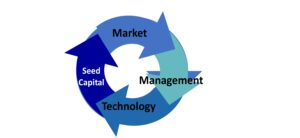
Eric is the Projects Lead and Vice-President of Project Capital+.
Eric Stambler has led the work of international expert teams on projects in West Africa, Eastern/Western Europe and Turkey. He has created and led international teams that participated in the development of projects and successfully led negotiations with potential investors and lenders.
Eric heads the West African office located in Lagos. He has successfully worked on projects in various sectors: Crop farming and processing, Cattle farming, Aquaculture, Greenhouses, Manufacturing and Packaged foods, among others.
In this interview, he shared his profound knowledge and expertise of financing for entrepreneurial ventures.
I hope you enjoy reading the great insights he shared with me in this written interview.
Q1. Please share with me briefly the work that Project Capital does and how the company provides support for investors via the work you do.
Since 1995, our team has successfully attracted financing for large-scale projects on behalf of select clients, across sectors, in challenging times and geographies.We have worked on four continents and over 20 countries. Our team can add significant value to owners of quality projects to attract competitive international financing.We know what investors want to see and we prepare the client’s project exactly the way investors want to see it. This involves in-depth market understanding and analysis, as well as understanding the risks and mitigating as many of them as possible.
Investors want to know that the people who approach them know there are risks in the project. Our documentation answers most of the questions investors have before they ask them.
Q2. What has been your experience with helping businesses raise funds, especially in understanding the feasibility of finding people to put funds into a venture?
Project sponsors become our clients because:
- They find their internal resources stretched by the complexity of preparing a project for financing.
- They are approaching private external sources of capital for the first time.
- They are experienced at bringing in outside finance, but know the value of having experts act as a buffer between themselves and Banks or Investors.
We are developers, not consultants. We do not write feasibility studies and do not tell our client what to do. Once we accept to work on a project, we assemble an expert team and develop the project in a way that attracts equity and debt financing in the best possible terms. We are originally developers and owners ourselves. We developed our own projects, went through failures and successes, and learned the process of preparing projects impeccably to attract investors in challenging markets. We analyze the project, in-depth, and may adjust the client’s original vision. The key items include the market and potential customers, technology, management, and financial performance.
Q3 What are the most critical components of developing a budget or financial plan ahead of time- especially when just starting up a new business?
Seed Capital is the initial investment required to develop a project from the conceptual phase to a well-defined project that attracts the attention of investors. Investing Seed Capital at an early stage is essential and more important to a project than purchasing hard assets. We use seed capital to meticulously put all critical pieces in place before approaching investors. This allows us to leverage a relatively small investment to maintain a substantial ownership stake for founders after investors participate. We assemble an expert team to analyze the project and its market, outline the opportunity, identify the risks so we can mitigate them, prepare a complete information package and understand what is necessary to succeed. In parallel, we test the interest of investors and banks, and understand their criteria and requirements. To be viable and ready for financing, a project must put in place 4 key elements

Q4. Can you share an example or moment when a feasibility plan did not work? What was the effect, and how did you handle the situation?
It is not like there is one moment where something doesn’t work. I’m not sure whether you mean the business did not go according to plan, or the fundraising effort was not successful.
In either case, it’s not as though there is a single moment of failure that is obvious. There are many cases where so-called feasibility studies were not realistic about the market the businesses were intended to address, or were overly optimistic that everything would be in place in the business to tackle it. We’ve also faced situations where there were challenges to raise funds for projects that we believed were very well-developed, and had many of the right pieces in place.In such cases we are very persistent, but there can always be an overreaction from investors to perceived changes in market conditions, or to events elsewhere in the world that may not seem directly relevant to the specific opportunity. In most cases, when engaging with investors, we prefer to get a “quick no.”
Then hopefully we can understand their objections or hesitations, and address them in the structure of the project, if need be. Otherwise, the situation just may not be for them, and we can rationalize their reactions.
We had a recent interaction with someone that had commitments from investors to a substantial venture equity fund in West Africa. The investors had already signed documentation, and the sponsor thought they were ready to kick off with operations.
The reason they gave for dropping out was the failure of Silicon Valley Bank in the US. It was unclear to me from what the sponsor described as to whether these investors felt this would have a direct impact on tech investments in Africa, or whether they themselves had lost money in banking investments in the US, or whether they got “cold feet” and just looked for the “nearest” excuse.
In any case, he has to regroup and search for new investors. Hopefully, he will also take the opportunity to re-validate his own business case and be sure it is still a compelling situation for new investors. Generally, when we are handling a fundraising, we are persistent unless we reach an overwhelming conclusion that there is not sufficient appetite from investors to proceed. You can hear many “no”s before you get to the “yes”.
It is important to learn and take feedback from every interaction, even if you disagree with their reasoning.
Q5. What advice will you give a new startup about finding investors, and using funding to build a sustainable business?
I think it’s a distillation of everything said above. Be very aware of your own target market and your existing competition, even if it appears to be indirect. Understand how the situation is evolving, and constantly update yourself to stay current. Even after raising the funds, this is critical. Don’t fall in love with your own ideas and constantly “stress test.” Don’t be discouraged when you hear “no,” and try to understand the reasons for the “no”.
Put the right team in place to overcome all the obstacles, both when developing the business and running it in a sustainable fashion. Get outside advice, either from an impartial financial advisor, or from independent-minded board members going forward.
THANK YOU

